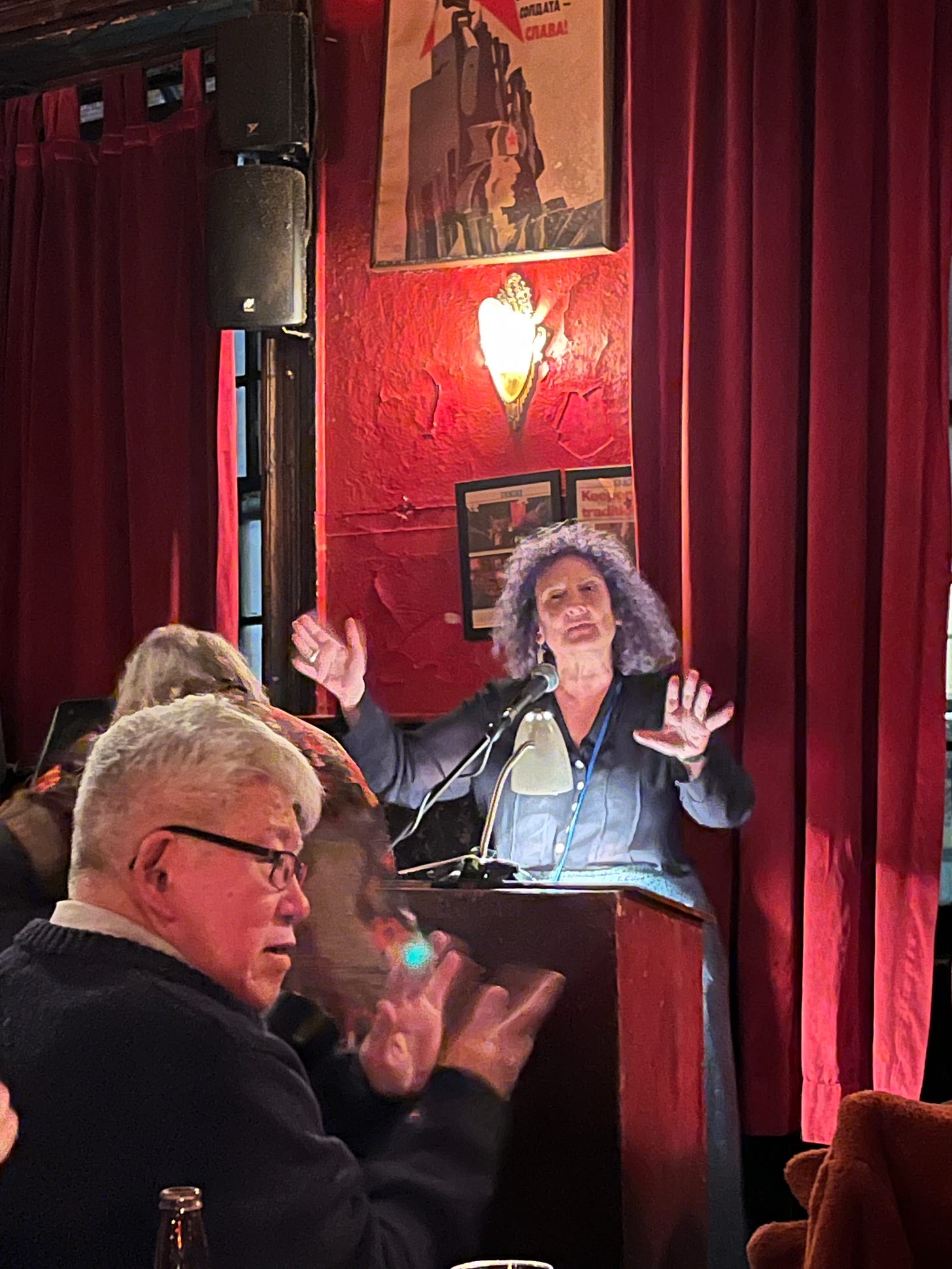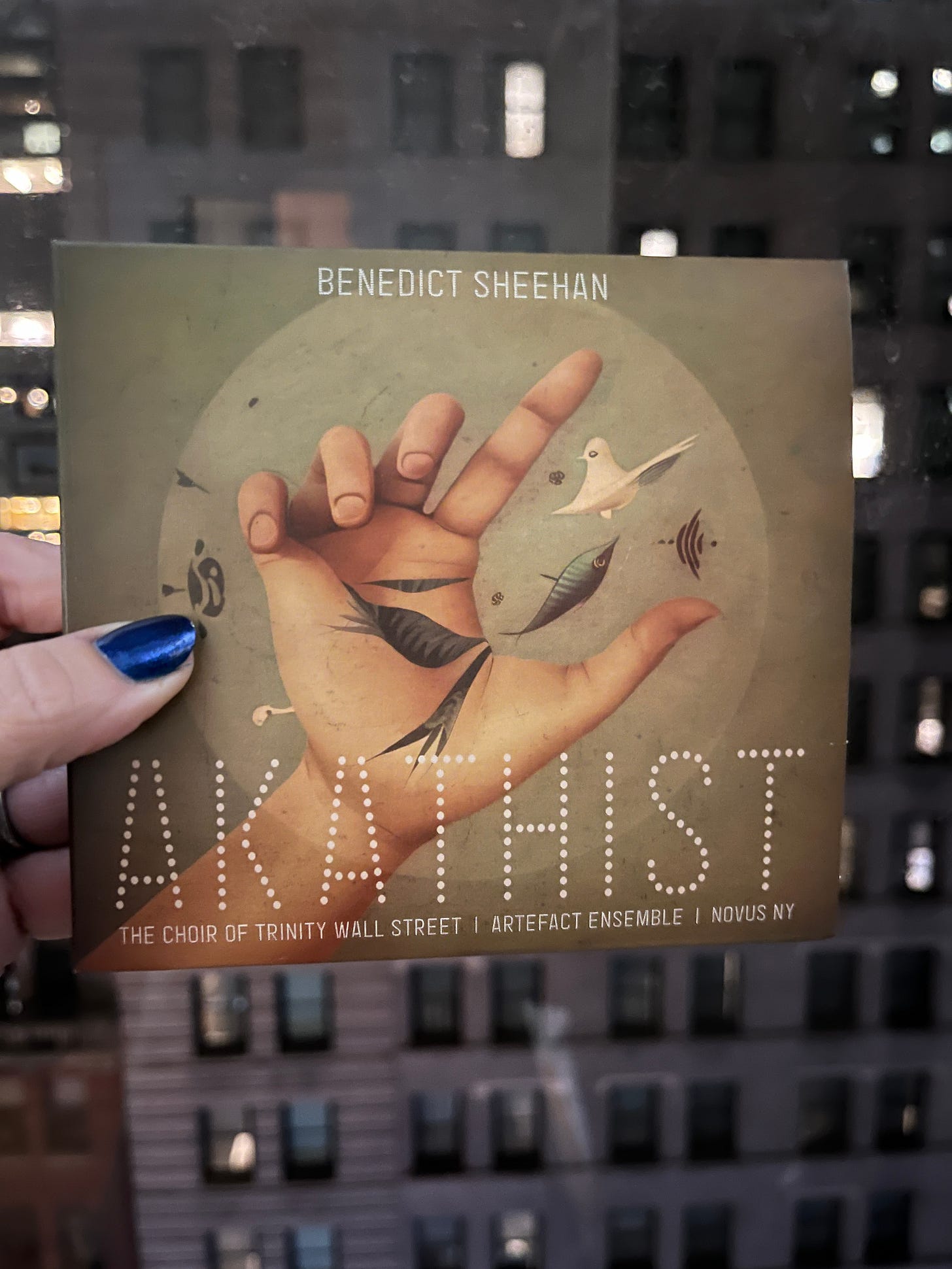Hi.
Did you expect me to greet you in some amusing and original way, like I usually do?
Where’s the fun in being predictable? It’s all comfort and no fun. But we need both, no?
I was just reading about the great masters of yore and how nearly all of these Old School Artists learned by copying — lots of art and then lots of objects. As a little kid, I actually learned Lithuanian grammar by being forced to copy a paragraph of text from a very very dull history book before I could get on with my Saturday morning. Now kids hold crayons and scribble their feelings long before they can name them.
These street buskers had three things I had not yet seen: 1) they put up a sign as they performed during the crush of rush hour, 2) they tag-teamed their original song in Spanish and English and 3) they had a mic and amplification which reached through my headphones and bore deep into my skull. It could have been heard four subway cars away. There was no escape; you were listening.
Despite the street busking professionalism above, I am definitely seeing a general degradation of all things that require discipline.
My kids don’t clean thoroughly, for example. Do yours? Do your roommates? Your spouses? In my house it is common for someone to volunteer to clean up the kitchen, but leave a small proportion of silverware unwashed in the sink, or a plate, or a pot unwashed. Or the dishwasher is purring but half the counter is covered in a sprinkle of bread crumbs and salt. It isn’t that the task isn’t done well, it simply wasn’t done thoroughly. They did a lot and then they just…moved on.
Does this imply a lack of discipline or something else? What is your definition of self-discipline? Can real discipline be erratic? It isn’t discipline if it is erratic; so what is it? Is there a term for “occasional discipline”?
Writing News:
Wrote a lot of poetry this week. Just on a kick I guess. Some of it was good enough to continue to work on, some of it is relegated to journaling, processing. I wrote a couple of flash pieces as well. I also wrote an essay about accidentally discovering the quirkiest new museum in Manhattan. (the link is a friend-link that gets you past the paywall on the photo essay).
My generative writing is slowly returning. It’s very hard to tell what has intrinsic worth and what only has a great many heavy emotions. Another way to put this is: what would other people want to read vs what should never see the light of day.

November’s literary salon, the Politics of Parenthood, ended up being surprisingly challenging to host given the heightened emotions subsequent to the election. It was interesting to moderate such an unabashedly partisan group of writers. I agreed strongly with them all, but I find that these days, when left to our own devices, if everyone is in the same political party, the group finds itself in an increasingly agitated state.
In groups where all completely agree, we grow agitated and all end up all shouting.
Did that always happen? or is it just the increased frustration of being unable to change things?
In any event, at the Literary Salon we all worked together on a very crowded Zoom to try NOT to yell and to instead seek a collective means by which to move forward and be more productive. I think it was effective—if you watch the playback link, let me know how you think it went.
I’m reading tomorrow at East Village Wordsmiths which bills itself as a neighborhood literary salon - it’s a curated reading series with occasional music and many regulars. One of my favorites is “Yesterday’s Horoscope” which always makes me laugh. The fun part for me is that the readings are three minutes long. If you don’t like one, there will be another in a heartbeat - and sometimes they really have lovely talent.
For your calendars: I have a longer reading January 7th at First Tuesdays curated by the warm and clever poet Richard Jeffrey Newman in Queens, and again on January 25th at the Lithuanian-American Alliance (it’s in English, you’re all invited!). 2025 will start very strong for me!
As for inspiration and literary community - this week I attended a reading at KGB Bar and went out after to talk about books and books and books. Good times.
Also saw a reading with a mini-lecture in the Lithuanian Consulate commemorating a Lithuanian author, Algirdas Landsbergis, who wrote passionate novels and plays and helped bring about Lithuanian Independence. It was great to spend more time with the curator/owner of the Maironis Museum (Maironis was also a famous historical Lithuanian author) and brainstorm translation opportunities.
One of his quotes struck me as quite pertinent right now:
“To reinstate a national identity, it means more to be a writer or an artist than it does to be a politician or a general.” — Algirdas Landsbergis (1924-2004)
And of course, in addition to those readings and the poetry reading I’m attending today (Sarah Kain Gutowski! I love her poetry!), I attended some theater: I got to see Bad Kreyol which was set in Haiti, as well as a play called Okuni (about the life of the groundbreaking woman who founded Kabuki theater) - oh speaking of Japan (sorry for that abrupt transition) I just wanted to give one last very grateful shout-out to my amazing travel companion Emily: she organized everything for my Japan trip and ensured that we knew the right logistics to get from one place to another - she took in all my crazy ideas (owl cafes! island art museums! sake tastings! visits with college roommates!) and added her own super ideas (onsen! bullet trains! swanky hotel breakfasts!) and blended our taste to create such an amazing itinerary (fabulous high-rise hotels with carpets of sparkling city lights! first class train travel! bookstore hotels!) that truly this trip was an unforgettable experience. (oh yes I want to go back! There are SO MANY more cities to visit! So much more to experience!)
Random Final Thought:
My daughter was nominated for a Grammy. Really.
Cool things can happen when you simply do the work you have to do to the best of your ability.







My peeps are the ones who frustrate everyone by refusing to fill out paperwork and just get something over with, those who favor the quixotic to the practical, but I respect those non-perfectionists out there, because I don't see how they have the motivation to just continue doing some of the work every time. I give them credit for doing that. I need the feeling that I've done something well. I do think people have characteristic levels of perfectionism, but it is the rare person who doesn't have some domains where they just try to get some things done. To be passable so they don't have to think about those things anymore. For me, that's probably going through my mail and brushing my teeth. Try as I might, I will rush through brushing my teeth while I space out.
I won't completely overlook that sometimes we have a responsibility to others, and that half-assing a task in a family context is not necessarily harmless. But I think we can start from the standpoint of happiness, and if someone is happy half-assing, I say, more power to them. The thing is, however, that not everyone is. One would think the end product would reflect what one wanted, but that's not always the case. The extent to which you do what you would ideally want, the extent that your controllable performance matches your intention, is what psychologists call self-efficacy. Not speaking as a psychologist, but just with common sense, people can be held back either because they don't know quite how to do the task (I always leave my mom's special cooking stuff out and don't put it away because I don't want to bother to figure out where it goes), or because, for some reason, doing the task is so psychologically scary that they flee the field.
Differences in self-efficacy aside, I generally think people's behavior will change in accordance with what they want. We have all seen particular kids and are unable to imagine how they are ever going to grow up, they seem so far from adults. But when they start wanting adult things, lo and behold, they start acting differently, working backwards from their goals. However, you suggest the young generations betray a malady of not completing their tasks that is new, and that does suggest something else is going on societally, and motivation is not just a natural process. From what I've heard college professors say, they would agree with this.
Here's a question for you. Are we really suffering from a crisis in discipline, or one in excellence as well? It really is very hard to do great work without tenacity, I think, no less for artists than for anyone else. So that is the concern for me. It's not lapsed discipline for lapsed discipline's sake that concerns me.
I made the questionable decision many months ago to reread "War and Peace" here and there, a page at a time, and that quotation of Algirdis Landsbergis reminds me of what I am engaging with in the second epilogue. Tolstoy chastises both those who think politicians and generals change history, and those who think writers do. He thinks the claim that writers have the power to influence history is absurd and just reflects a wishful thinking born of their being writers. He thinks physical and literal power is necessary to direct power, and even heads of state only hold this indirectly, by directing people who direct people who direct people. Yet, Tolstoy was very much a patriot (he uses "we" in discussing the Russians in the 1812 war), and Pierre says, "When I am absorbed by an idea, nothing else is serious." So his thoughts about idealism are complicated.
My own view is I think it's absurd how we run right to a politician when we look to name a bridge or street. To me, since they are practical first and foremost, politicians are almost not great by default. We are already too quick to remember them before other people. Why should memorials worsen this tendency? Greats are people who create, as artists do, not people who make the best use of others' ideas, as politicians do.
talented family!